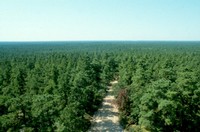Young Scientists Study New Jersey Pinelands During Rutgers—Camden Summer Research Program for Undergraduates
CAMDEN -- Ten undergraduate college students are advancing the knowledge of New Jersey’s Pinelands this summer, thanks to an intensive 10-week summer research program at Rutgers University-Camden.
Funded by a $272,805 National Science Foundation grant, the Research Experience for Undergraduates program connects undergraduate students with world-class Rutgers—Camden professors in such disciplines as biology, ecology, chemistry, and physics. Through this multidisciplinary effort, the REU program provides the student-scientists with the extraordinary chance to experience cutting-edge research across numerous areas.

The participants are studying the New Jersey Pinelands, a unique 1.1 million-acre ecosystem that has been declared an International Biosphere. Occupying 22 percent of New Jersey’s land area, the Pinelands are home to 850 plant species, 299 bird species, 91 fish species, 59 reptile species, and 39 species of mammals.
During the first two weeks of the program, the students resided at the Rutgers Pinelands Field Research Station in New Lisbon. They currently are pursuing their independent research projects in laboratories on the Camden Campus of Rutgers, The State University of New Jersey.
“Although unique at many colleges, the opportunity to engage in cutting-edge research while still an undergraduate student is intrinsic to the Rutgers—Camden experience,” notes Michael Palis, interim dean of the Rutgers—Camden Faculty of Arts and Sciences. “This innovative program expands that focus into a total immersion experience that will help to shape the careers of these future scientists. I can think of no better living laboratory than New Jersey’s Pinelands, an ecosystem that sustains our entire state and yet still holds so many mysteries.”
Moorestown resident Kimberly Donat agrees. The Rutgers—Camden biology major is studying the presence of the Chytrid fungus in streams and on amphibians in the Pinelands. She’s also living the dream of every budding young scientist: in-depth research with one-on-one guidance from an established faculty mentor.
“One of the best things about this project is that it's very individualistic,” says Donat, a 2005 graduate of Moorestown High School. “We are learning the process of being researchers, developing hypotheses, carrying out experiments, and re-evaluating when our methods don't work. Most employers and graduate schools are looking for people that already have a general idea of how everything works, and this program provides that experience.
Collingswood resident Andrew Boddorff, a junior chemistry major at Hamilton College, has discovered the potential for a career as a research scientist as a result of the Rutgers summer program. “When I started this program, I was unsure of what I thought about research in a laboratory,” he says. “I now have a better understanding of what is involved in being a research scientist, and I find I like it!"
Boddorff is examining the thermal decomposition of leaf litter in the Pinelands utilizing TGA-IR (thermal gravimetric analysis with infrared spectroscopy) in order to better understand the role of plant nutrient cycles in forest fire events. “As any full-time student knows, research is a time-consuming process that requires a dedicated focus, something that I would not be able to fully give during the academic year,” he says. “During the summer, the conditions are perfect for both faculty and students because each have the necessary time to devote themselves to furthering science.”
Funded by the Division of Biological Infrastructure and Chemistry at the National Science Foundation, the grant was awarded to Cherry Hill resident Heike Bücking, an assistant professor of biology at Rutgers—Camden. While studying the Pinelands, the students also are gaining first-hand experience in writing for peer-reviewed journals, scientific ethics, environmental justice, and experimental design and data analysis.
The full-time internship provides each student with a summer stipend, as well as room and board on the Rutgers—Camden campus. Participating students are from New Jersey as well as from afar, including California and Puerto Rico.
Rutgers faculty mentors include Bücking, Georgia Arbuckle-Keil (professor of chemistry), John Dighton (biology professor and director of the Rutgers Pinelands Field Station), Dennis Gray (Rutgers Pinelands Field Station), Joseph Martin (professor of biology), William Saidel (associate professor of biology), Daniel Shain (associate professor of biology), Peter Palenchar (assistant professor of chemistry) and Daniel Bubb (associate professor of physics).
-30-
Media Contact: Mike Sepanic
(856) 225-6026
E-mail: msepanic@camden.rutgers.edu